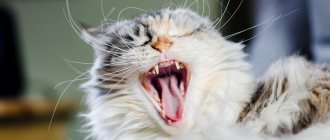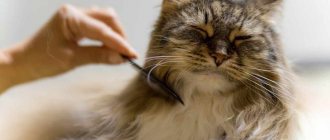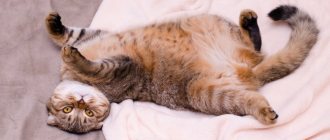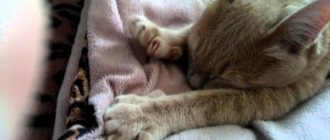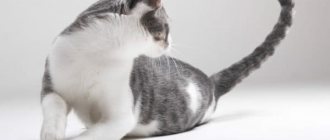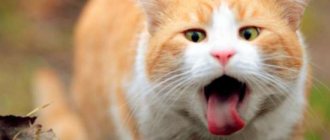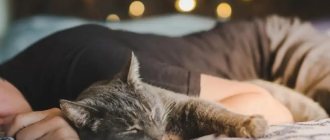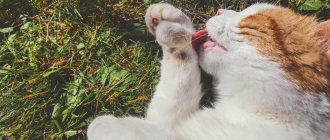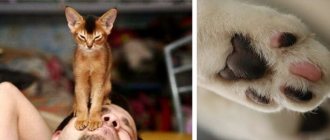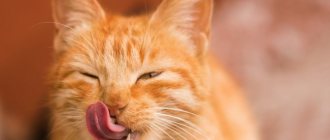Yawning is a common involuntary behavior. Scientists have not yet figured out the exact reason why cats yawn, despite how common it is. Some theories as to why your cat yawns when he sees you are worth considering.
The cat will yawn when it sees you because it feels content and comfortable. This is a way to show that your pet is completely relaxed in your presence. Yawning is your cat's way of getting more oxygen and waking up as she wants to regain her energy and is ready to spend time with you. Of course, some cats just want to sleep.
Some experts suggest that cats yawn as a unique form of communication. Yawning works like body language to get your attention, except for actual meowing. In most situations, an occasional yawn means that the cat is relaxed.
Your cat needs more air
Sometimes cats open their mouths wide and yawn to take deep breaths. This may indicate that your pet is having difficulty breathing.
If you notice that your cat is yawning a lot, it's probably a good idea to take her to the vet as soon as possible. While this may not be dangerous, it's worth being on the safe side just in case.
© shutterstock
Many people yawn when they stretch, which is completely normal. However, this is their way of getting more oxygen. This is usually not something you should worry about unless it is accompanied by some abnormal behavior.
How to help an animal with frequent yawning?
If your cat yawns frequently, you need to analyze the cause of this condition and eliminate the problem.
- Provide peace and quiet to the animal if it does not get enough rest or does not get enough sleep.
- Reconsider the diet towards something lighter and more easily digestible if your cat constantly yawns after eating.
- Provide the cat with more attention, active games, physical or intellectual exercise if he is bored at home without his owner.
- Protect the animal from stress as much as possible. In the event of a suspected tense situation, give him a sedative - drops, tablets, or use calming drops on the withers or a diffuser.
- If unusual changes in behavior occur due to yawning or other alarming symptoms, it is important to immediately consult a veterinarian.
One of the popular sayings is that cats yawn when the weather is clear and warm.
Now you know why cats yawn. Did the imitative reflex work for you? How many times did you yawn while reading this article and looking at photographs of touchingly yawning pets?
Boredom
Another explanation for a kitten yawning is that it is bored. Cats can get bored and anxious, just like their owners.
If you don't give your cat enough attention or play with him every day, boredom can quickly creep in. Almost all animals breathe deeply when they are stimulated in some way. If your pet doesn't get enough mental and physical stimulation, he may start yawning.
It's important to make sure your fuzzy friend gets the attention he deserves every day. You should take time to play with your cat, especially if it seems like she might be bored.
You may interpret this behavior as your cat trying to tell you that she needs to be entertained and that this is partly your responsibility.
Everyday Reasons for Frequent Yawning
Cats, like humans and other animals, behave in a similar way and begin to yawn under certain conditions:
- Stuffiness in the room . Increased humidity, temperature and lack of oxygen cause yawning to provide additional air.
- Confusion of the animal . In this state, a good yawn helps you quickly make a decision for further action. Again, this is due to the increase in oxygen concentration in the animal's blood and brain.
- Boredom . Against the background of this state, drowsiness increases, and yawning becomes the expected result of a lack of entertainment.
- The period after eating . For complete digestion, the body redistributes blood, resulting in most of it accumulating in the digestive system. Blood circulation in the brain decreases. Yawning helps compensate for oxygen deficiency.
- Physical fatigue. Yawning in this case means going to bed soon. A long rest will compensate for the loss of strength in the future, and the pet will wake up cheerful and active.
As you can see, yawning is not something inexplicable. All physiological processes in the body have a clear sequence and mechanisms to compensate for the listed conditions.
Owner's actions. In order for the pet to feel good, the owner must follow the recommendations of specialists:
- First of all, you need to let your cat sleep as much as she wants. You cannot intentionally wake a cat, even if it keeps you awake at night. There are more humane ways to solve this problem.
- During the daytime, you should pay more attention to your pet and play active games with it. This will not only allow the animal to release all excess energy, but will also strengthen the bond with the owner.
Whatever the innate instincts and habits of the mustachioed tabby, exercise during the day will ensure healthy and sound sleep at night.
Discomfort
There is a chance that your cat is yawning due to some kind of discomfort. Some cats yawn if they experience pain, especially in the mouth. This could be anything from a toothache to a sore mouth.
If you notice that your cat is drooling excessively and yawning a lot, it's time to visit your veterinarian. It is very likely that something is wrong with them and needs to be sorted out.
You should also pay attention if your cat seems to be pawing at the mouth. This could very well mean that they are in pain for some reason. In this case, the cat may attack if you try to touch its mouth. These are all signs that something is wrong with them.
© shutterstock
Causes of yawning in cats
Cats yawn for a variety of reasons. Some of them are safe and natural, others require attention from the owner and solution to the problem. Oxygen deficiency is the main cause of yawning in cats, which can be caused by various factors. Which ones?
- Awakening.
During sleep, the animal's brain activity slows down, as does the blood flow, and accordingly, carbon dioxide accumulates in the blood. To restore brain activity after sleep, you need to enrich the bloodstream with oxygen, and nothing can do this faster than yawning.
- Physical activity.
Any active action, especially hunting for prey, depends on good oxygen saturation of the brain and the work of the heart at the time of running and attacking. To activate the process, the cat may yawn before jumping. But a long-term lack of sufficient mobility causes oxygen starvation and yawning in cats.
- Overwork
.
Fatigue is a natural process of any living creature. In order not to instantly fall asleep when very tired, the cat yawns, thus supporting the body’s functioning. Tired animals are characterized by a decrease in brain activity; accordingly, yawning will occur purely as a reflex.
- After meal
.
A delicious lunch requires some energy to break down foods and distribute nutrients and beneficial substances throughout the body to organs and tissues. Accordingly, the blood flow sends it not only to the brain, but also to the digestive system. The denser, more satisfying and high-calorie food is, the more energy will be required to absorb it. That is why preference is given to easily digestible foods, after which cats not only feel better, but also yawn less.
- Imitative reflex.
This phenomenon usually works in people: when one person yawns, the second has a similar desire. Sometimes this behavior is also typical for animals, and the cat yawns while looking at the owner who yawned a moment earlier.
- Stressful state
.
Inside a cat’s body, under stress, hormones, adrenaline and other substances are released into the blood, which, in turn, affects brain activity. Accordingly, by yawning, the cat reflexively tries to clear the bloodstream of decay products and improve brain function. As a rule, this phenomenon is observed during transportation of the animal or when visiting a veterinary clinic.
- Discomfort in the oral cavity.
Toothache, inflammation of the gums, wounds, a foreign object stuck in the mouth - all this can cause frequent yawning in a cat. At the same time, the animal begins to drool profusely and constantly touch its mouth with its paw.
- Changes in atmospheric pressure.
They affect not only people, but also pets. Cats suffer from low or high blood pressure, headaches, decreased appetite, and sometimes vomiting.
- Neurological disorders
.
Yawning is one of the symptoms of some neurological diseases. However, other signs associated with changes in the animal’s behavior also appear. Depending on the illness, the cat's head may tremble, he may grind his teeth, swallow frequently, or the owner may notice a loss of coordination of movements. As a rule, such yawns differ from ordinary ones in that they are more frequent, short and convulsive.
In the evening, cats yawn not because they are tired and want to sleep, as many owners think. They are preparing for their next activity - nocturnal, characteristic of most predators, which include the cat family in their natural habitat.
Your cat imitates you
There is a known phenomenon among people when one person yawns if he sees another doing it. The scientific term for this is “mirror neuron response.” Some researchers believe this could even happen between two different species.
This means that your cat may yawn simply because it notices you yawning. Next time you find yourself yawning in the same room as your kitten, take a quick look to see if they've copied you. It may seem far-fetched, but it's definitely not the strangest theory about cat yawning.
Psychological and physiological reasons
Yawning for cats is an uncontrollable process during which a deep breath is taken and a quick exhalation is made. Hyperventilation increases oxygen levels in the body and stimulates brain function. Normally, blood enrichment is necessary for a number of reasons:
- "Loading the body" . Immediately after waking up, immediate activation of all processes in the body that were significantly slowed down during sleep is required. A deep yawn allows you to quickly raise the level of oxygen in your blood and get rid of excess carbon dioxide.
- Tactical move . A seemingly strange phenomenon can be observed during a hunt. Despite all their concentration, the cats suddenly begin to yawn. This occurs to sharply raise the level of oxygen in the blood before the subsequent burst.
- Ready for night adventures. In the evening, cats yawn not because of drowsiness, but to additionally conserve energy. Therefore, yawning is just preparation for night activities.
Also, by yawning, animals demonstrate their superiority and dominant role in the occupied territory. This is how most representatives of the cat family behave.
When a cat yawns: what are the reasons for this phenomenon?
So, a cat has a yawn reflex in the following cases:
1) After sleep. When the cat sleeps
, brain function slows down. Blood flow slows down, brain activity slows down, and carbon dioxide accumulates in the blood. Accordingly, upon waking up, it is necessary to establish brain activity, so nature provided for yawning - a quick enrichment of the blood flow with oxygen.
2) During times of stress. Stress leads to the release of harmful substances into the blood, which leads to a decrease in brain activity. Accordingly, to remove these substances, it is necessary to yawn tightly and, so to speak, relieve tension. You can observe a picture when a pet yawns due to stress, for example, in a veterinary clinic, when the four-legged dog is waiting in line with the owner to see a specialist. At this moment, the pet is surrounded not only by a lot of smells, but also by a new environment, which can easily confuse a pet that does not go outside.
3) After eating. To break down foods, part of the energy in the bloodstream is sent not to the brain, but to the digestive system, in order to ensure the breakdown of recently eaten food. The number of yawns at this moment increases in order to maintain brain activity at the desired level. It is worth noting that heavier cat foods
, poorly digestible, cause more frequent yawning than easily digestible ones.
4) As a consequence of overwork. After a long trip somewhere in a carrier, your pet may simply get tired. Brain activity will be reduced. To restore it, the cat yawns reflexively.
5) Due to some neuralgic disease. If blood flow is disrupted and harmful elements are removed from the animal’s body, in particular the brain, the pet may yawn regularly. And if other symptoms or behavioral characteristics are observed, you can safely go to the veterinarian and look for the cause of the disease.
To stop your pet from yawning you need to:
1) Allow the animal to get enough sleep, that is, organize a daily routine.
2) Provide physical activity, namely, play more. The latter is easy to do if you use special toys for cats.
, allowing you to use all muscle groups in the body of the baleen-striped.
3 Balance your diet. Food should be easily digestible
4) Try to reduce the number of stressful situations. If such problems occur, use special herbal preparations to relieve tension, fear, stress, allowing the four-legged animal to relax.
5) Be regularly examined by a veterinary specialist; in case of illness, carry out treatment measures in a timely manner.
Recently I was asked a question: “Tell me, how can I tell if my cat loves me?” Really, how? I thought about it because I had never asked myself this question. We had to think about it together. It turned out that this man’s life circumstances were such that, not being able to get a dog, he got a cat... He is sure that he loves her, although he admits that he is far from adoration, and thinks that she treats him simply as a breadwinner .
Natural and forced yawning - how to distinguish?
You need to understand that even if a cat yawns often, it does not control this process. Yawning is an involuntary action that is almost impossible to suppress. Such a strong reflex is due to the fact that a yawn provides oxygen to the brain - the most important, one might say, governing organ of the body.
Note!
The reasons for yawning are always low blood oxygen saturation. Your task is to determine whether oxygen deficiency is a symptom of illness.
Natural causes of yawning:
- After waking up
- we discussed this case above, while the cat is sleeping, its organs are not working at full capacity, and a yawn makes it possible to mobilize the body. By the way, during a yawn and a sharp enrichment of the blood with oxygen, the same active displacement of carbon dioxide from the blood occurs. This process leads to increased brain activity and speed.
- In a stressful situation,
adrenaline, other hormones and substances enter the cat’s blood, leading to increased activity of the brain and the whole body. Yawning compensates for oxygen costs and helps the blood quickly clear itself of decay products, substances “thrown” into the blood. Stressed yawning can be accurately detected when a cat is in an unusual environment - in a car or a veterinary clinic.
- Immediately after eating
- for most of the day, the main volume of oxygen is distributed evenly throughout all organs, but after eating, the digestive system is activated. Food enters the stomach, is partially processed by acids and passes into the intestines. Through the mucous membranes of the intestines, beneficial substances are absorbed into the blood and distributed throughout the body. To increase blood flow and speed up the feeling of satiety, the cat instinctively yawns. In addition, yawning helps maintain a comfortable level of oxygen in the blood for the brain.
- After physical activity
, all living beings can get tired; yawning helps maintain a normal level of vital activity. If a cat could not yawn, tired, it would immediately go to bed (as most apartment pets do), but when this is not possible, reflexive yawning maintains the functioning of the body.
Photos of yawning animals decorate more than one desktop on computers around the world. GIF animation of the cat yawns collects thousands of views. Perhaps every person has seen a cat yawn at least once in his life. At the same time, the animal opens its mouth wide, closes its eyes and freezes for a moment. When the brain lacks oxygen, a person yawns to compensate for the deficiency. What is the basis of yawning in cats?
Forced reasons
Yawning is always a lack of oxygen. The owner should be alerted by the pet's frequent yawning, state of apathy, lethargy. After all, yawning can be a sign of illness :
- changes in atmospheric pressure can cause high or low blood pressure in a cat, cause headaches, vomiting, and lack of appetite;
- neurological disorders - neuroses, brain tumors - cause oxygen starvation of the brain and, by yawning, the animal somewhat relieves its well-being.
The consequences of diseases can be very serious, so it is not recommended to independently diagnose your pet and self-medicate.
Many owners are touched when their cat yawns, stretches, sits down, and an absolutely satisfied expression spreads across her face. Have you ever wondered why four-legged animals yawn, does this reflex matter for the life of the animal? Let's figure it out.
What happens when a cat yawns?
Yawning in a cat is an uncontrolled respiratory process of the body, consisting of a deep, slow inhalation and a quick, sharp exhalation. The result of the process is the enrichment of blood with oxygen and an increase in the rate of vascular blood exchange in the brain. And this leads to the enrichment of brain cells with nutrients coming from the bloodstream and cleansing them of carbon dioxide and harmful substances. Consciousness becomes clearer, well-being improves, some lightness appears in the body, and stress is relieved.
Natural and forced yawning
Yawning is an involuntary action. The cat does not control the process. She yawns when the body needs to enrich the brain with oxygen.
The reason for yawning is lack of oxygen. You need to understand why your pet is yawning, and whether this is a sign of illness.
Natural causes
There are a number of natural reasons why four-legged animals yawn. These include :
- Yawning after sleep (discussed above).
- Stressful situations. During times of stress, a portion of adrenaline and hormones are released into the blood, putting the body on “combat readiness.” In this case, more energy is expended and oxygen reserves need to be replenished to maintain brain function. The animal yawns. A similar situation can be observed when the cat is, for example, at the veterinarian or in the car.
- Yawning after eating. Food that enters the body begins to be digested, and nutrients enter the blood and are distributed throughout the body, nourishing tissues and organs. To increase the speed of blood flow, the same oxygen is required, and the cat begins to yawn.
- It has been noticed that sometimes a cat yawns while looking at its owner when he yawns. The imitative reflex is triggered when everyone around begins to yawn.
